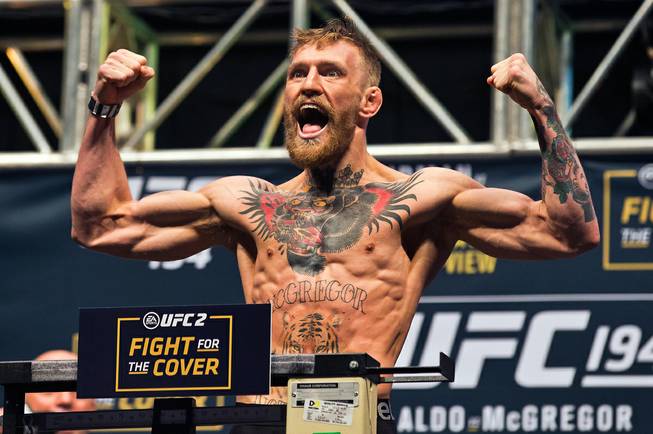
UFC featherweight interim titleholder Conor McGregor flexes and yells during UFC 194 weigh-ins Friday, Dec. 11, 2015, at MGM Grand Garden Arena.
Saturday, June 25, 2016 | 2 a.m.
Related Coverage
Every time a UFC fighter enters the octagon, they are faced with a myriad of dangers. The flying fists, feet, knees and elbows put their health at risk, not to mention the chokes and joint submissions.
But many believe mixed martial artists face their most dangerous task far before they ever step foot in the cage — making weight.
Recently the UFC, in partnership with multiple state athletic commissions, has tried to make that process safer.
Fighters participating at UFC 200 on July 9 – and the other two events in Las Vegas that week – will step onto the scales from 8 to 10 a.m., as much as eight hours earlier than the traditional 4 p.m. start to the event.
“The UFC is changing their weigh-in period so that their fighters have more time to hydrate and get proper nourishment to assure they are as healthy as possible heading into the fights,” said Bob Bennett, executive director of the Nevada State Athletic Commission. “It’s all predicated on the health and safety of the fighter. We requested that the UFC come before the commission and tell us why they wanted to do this, and then the commission voted in favor of it.”
Many fighters drain their bodies of as much water weight as possible in order to fight at weight classes well below their normal weight. This has lead to rare but serious health issues.
The most serious case came when a fighter died on Dec. 11, 2015, after complications from trying to cut weight for his ONE Championship fight in Beijing. Yang Jian Bing, 21, suffered from severe dehydration and suspected heartstroke before passing away due to cardiopulmonary failure.
The instances have been less prevalent in the U.S., where athletic commissions follow stricter regulations, but preventive steps are being implemented.
“The UFC is consistently on the cutting edge of MMA,” Bennett said. “This change is indicative of the training they have for their athletes, the performance enhancing drug testing with U.S. Anti-Doping Agency and the nutrition programs they have put in place for their fighters.”
The new weigh-in procedures were already used on two other occasions — at UFC 199 in Los Angeles and UFC Fight Night 89 in Ottawa, Ontario. Bennett said they both went off without a hitch, and drew positive reaction from fighters.
Under the new rules, Bennett will monitor fighters weighing in at the host hotel.
The UFC will still hold their televised weigh-in event where fighters face off with one another at the regularly scheduled time but the weights read for each fighter will be what they weighed in the morning.
If a fighter misses weight in the morning, he or she will not have a second chance to make weight in the afternoon, according to UFC Vice President of Athlete and Health Performance Jeff Novitzky.
“The NSAC has requested that after six months we want to see the statistical data that the UFC is collecting, to prove that it is a success and truly in the best interest of the fighter,” Bennett said. “There have been a litany of commissions that have discussed this, and it can only be done with scientifically proven evidence.”
One possible concern is that fighters will have more time to put on weight in between the weigh-in and fight, thus creating a larger gap in weight between fighters on some occasions.
Bennett and the rest of the NSAC don’t believe that will be an issue.
“It’s something that has been discussed, but it didn’t prove to be that way in L.A. or Ottawa,” he said. “The NSAC performed a weight study looking at guys that dropped a lot of weight, and gained like 17 pounds before the fight, compared to those that only gained a couple pounds, and in those fights no one had a real advantage.”
The UFC has yet to decide if they are going to keep this as the standard procedure moving forward, but it certainly seems to have nothing but positive feedback to this point.
“It has been a success for the first two events,” Bennett said. “I commend the UFC for consistently trying to protect the health and safety of the fighter, and this is just another example.”
Jesse Granger can be reached at 702-259-8814 or [email protected]. Follow Jesse on Twitter at twitter.com/JesseGranger_.

Join the Discussion:
Check this out for a full explanation of our conversion to the LiveFyre commenting system and instructions on how to sign up for an account.
Full comments policy